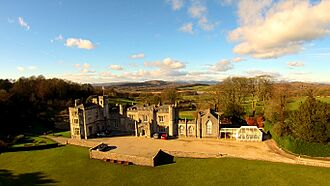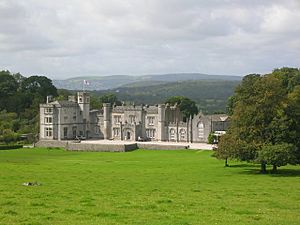Leighton Hall, Lancashire facts for kids
Quick facts for kids Leighton Hall |
|
|---|---|

View of Leighton Hall
|
|
| General information | |
| Architectural style | Georgian, Gothic Revival |
| Location | Yealand Conyers, Lancashire, England |
| Coordinates | 54°09′47″N 2°46′33″W / 54.1630°N 2.7758°W |
| Elevation | 200 feet (61 m) |
| Renovated | 1870 (restored) |
| Design and construction | |
| Architect | John Hird Paley and Austin |
|
Listed Building – Grade II*
|
|
| Official name: Leighton Hall | |
| Designated: | 2 May 1968 |
| Reference #: | 1071836 |
Leighton Hall is a beautiful old house located near Yealand Conyers in Lancashire, England. It is about 0.5 miles (0.8 km) west of the village. This historic building is very important and is listed as a Grade II* building. This means it has special historical or architectural value. Today, Leighton Hall is still a family home, but it also welcomes visitors to explore its history and lovely grounds.
Contents
The Story of Leighton Hall
Early Owners and Challenges
Leighton Hall was once the home of Sir George Middleton. He was an important person in Lancashire in the 1600s. Later, the house passed to his grandson, George Middleton Oldfield. After George died in 1708, his daughter Dorothy and her husband, Albert Hodgson, lived there.
Albert Hodgson became involved in a historical event in 1715. Because of this, he was captured. Sadly, the house was burned, and his belongings were taken away. In 1722, a friend named Mr. Winkley bought the house at an auction. He allowed Hodgson to live in the partly ruined house after he was released.
New Beginnings and Changes
The estate then came into the hands of George Towneley. He was a wealthy man from Burnley. This happened when he married Albert Hodgson's daughter, Mary, in the 1750s.
The house you see today was built for George Towneley between 1759 and 1761. It was designed in the Georgian style by an architect named John Hird. The woods around the house were replanted, and the park was designed in 1763. George and Mary Towneley did not have children. So, George's nephew, John, inherited the estate. John sold the house in 1805.
The Gillow Family Era
In 1822, the property was bought by Richard Gillow. He was the grandson of a famous furniture maker named Robert Gillow. Richard Gillow changed the look of the house. He added features in the Gothic Revival style between 1822 and 1825. He used local white limestone for these changes.
In 1870, Richard's son, Richard Thomas Gillow, hired architects from Lancaster. These architects, Paley and Austin, added a new three-story part to the house. This new section included a billiard room and guest rooms.
Richard Thomas Gillow died in 1906. The hall was not in good condition at that time. His grandson, Charles Richard Gillow, took over. Charles died in 1923. His wife continued to live at the hall until she passed away in 1966 at the age of 96. The property then went to her daughter Helen, and then to her grandson, Richard Gillow Reynolds. Richard and his wife, Susan, are the current owners of Leighton Hall.
Recent Recognition
In October 2021, Leighton Hall received money from the government's Culture Recovery Fund. This fund helps important historical sites in England. In 2023, the hall won the Sustainability Award from the Historic Houses Association. This award recognized their efforts to be environmentally friendly.
Leighton Hall has also appeared on television. It was featured in a 1984 TV show about Sherlock Holmes. The hall was used as the setting for a fictional place called Ridling Thorpe Manor.
Images for kids
 | Kyle Baker |
 | Joseph Yoakum |
 | Laura Wheeler Waring |
 | Henry Ossawa Tanner |




